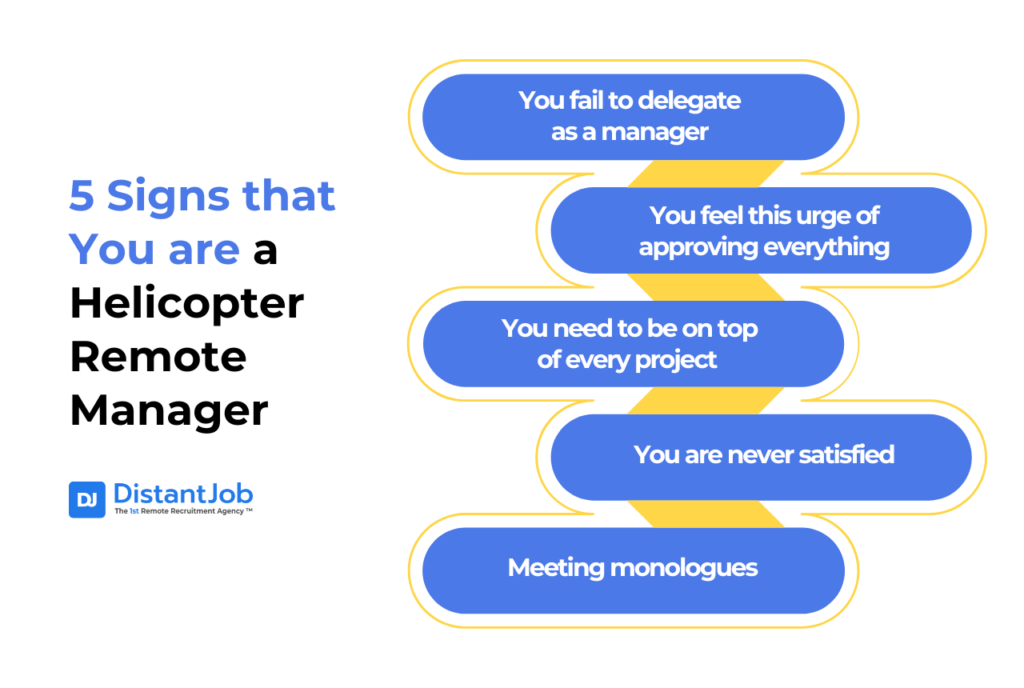Think you’re just being thorough and protective as a manager? You might be a helicopter manager without realizing it. Like a hovering parent with well-meaning intentions but suffocating impact, micromanaging can unintentionally clip your team’s wings while trying to shield them from failure.
Now, you might be thinking: “But my reasons come from a good place!” or “I mean well; I just want them to avoid errors.” And that’s true—most helicopter managers have good intentions. The problem is, this approach doesn’t land well with employees. In fact, studies reveal that 70% of workers think about quitting because of micromanagement, and 30% actually do. Even if your hovering comes from a good place, it’s likely pushing your best talent away.
Let’s explore the tell-tale signs of helicopter management, its hidden costs, and most importantly—how to transform from a hovering supervisor into a leader who truly empowers their team to thrive.
Helicopter Management Definition
Managers who fail to trust their employees and have this inner voice saying to them “you need to go and check if your employees are working” all the time are known typically as micromanagers. We’ve all experienced bosses like these, who think this style will increase productivity, but it’s the other way around.
Besides being called micromanagers, they also are known as helicopter managers.
The helicopter manager’s concept is not initially related to the work environment but is directed to parents when handling teenagers. The metaphor of helicopter parents appeared in 1969 in the bestselling book written by Dr. Haim Giott, Between Parent & Teenager, which mentions a teen complaining that her mother hovers her like a helicopter.
Years later, the term ‘’helicopter parent’’ gained more popularity, and it was used to describe parents who pay extremely close attention to their children’s experiences and problems.
What is the helicopter view in management? A helicopter boss has the same behavior as a helicopter parent but is translated into the work environment. This means that managers who pay too much attention to every move an employee makes and can’t leave them to work on their own enter this management category.
But what’s wrong with caring too much about employees? What’s wrong with making sure the work they’re doing is okay?
When you are a virtual leader, it’s challenging to know when ‘managing’ employees and continually asking them questions might be too much, because you fear that they might feel lonely or left out. But, if you don’t measure your behavior, you might fall into the helicopter remote management, negatively affecting your remote team’s performance (and wellbeing).
Helicopter Manager vs. Micromanager: How are they actually different, if at all?
Although these terms are often used interchangeably, they don’t necessarily mean the same thing.
We’ve talked about this before – the idea of a helicopter manager (or helicopter boss) comes from helicopter parenting. Just like helicopter parents take excessive care of their children, helicopter managers keep a close eye on their team with good intentions. They go overboard because they want to make sure their employees do well—they care about how people feel and try to shield their careers from risks or failure.
Micromanagers, on the other hand, don’t care much about their team’s emotional or career development. Their main concern is to control how tasks get done and make sure work meets their exact standards—often due to their own insecurities or worry about failing. You might compare them to narcissistic parents who are far more interested in their own reputation than how well their kids (or team members) are doing.
Both approaches, though, have a big problem: they stifle independence and innovation, creating workplaces where employees find it hard to improve, take the lead, or feel that others believe in them. And, as with everything else in life that isn’t going that well, seeing these differences is the first move towards creating better ways to lead.
Micromanaging Remote Teams: Effects
The remote workplace environment has many challenges. We’ve all read about the great benefits of working remotely and how awesome it’s to be the master and owner of your time. Or about how productive you can be when you work in the comfort of your house! So many good things, but hidden in these great benefits, are the challenges – especially when you lead a remote team.
Successful remote team leaders know that organization, communication, and passion are crucial for a company to be directed on the right path. But how to get employees working at full speed without burning them out? Without them hating the company? Culture is a way of creating this great remote environment, but remote leaders must take a step back and analyze if their leadership approach is the best one.
Many leaders micromanage their teams without being aware of it.
Employees who have bosses with helicopter management style tend to produce less and reduce their levels of creativity. They often feel their work is not good enough because they have a boss who is always asking them questions about everything they do. But worse than that, micromanaging bosses prove that they don’t trust their employees due to their managing style.
All of these impacts significantly a remote company. When trust is not the foundation of remote teams, and bosses feel this urgent need of hoovering their employees, one of the significant effects besides burnout and high-stress levels is low employee engagement.
Gallup states that employees with low engagement, have:
- 37% higher absenteeism
- 18% lower productivity
- 15% lower profitability
Economically speaking, having disengaged employees cost you 34% of their annual salary, or $3,400 for every $10,000 they make.
5 Signs that You are a Helicopter Remote Manager

Taking a step back and analyzing your leadership style also means asking the right questions to yourself about how you manage your remote team. You might be in the denial phase, thinking you are the perfect manager for your remote team. Or you might not even consider questioning if your approach is the right one.
Here are the 5 signs that you’re a helicopter boss and how to stop it:
1. You fail to delegate as a manager
Power, power, and more power for you! Why? Because no one can do a better job than you.
At least that’s why your inner voice says. Get rid of that thought and start trusting your employees capability. Because, here’s the thing—when you take on too much responsibility, you’re not just overloading yourself; you’re also holding your team back from growing and showcasing their potential.
And, in order to delegate more and better, it all begins with hiring the right talent for your team. This is why the recruiting and hiring process needs to be reliable. You can’t go improvising and hoping that the next candidate that applies will be the right one.
Be strict with the characteristics you think your employees should have. Besides the technical abilities, also consider the importance of the skills that make remote works successful. Skills such as communication, time-management, self-reliance, etc.
When you hire talented candidates, trust is easier to build. Also, hire candidates that know more than you in certain areas. Don’t fool yourself thinking you are the mastermind behind everything. Even though you are the leader, employees may have different and creative approaches while working on a project.
Solution: Start small. Delegate one task or responsibility to a trusted team member and observe their performance. As you grow more comfortable, gradually hand over larger responsibilities. Use collaboration tools like Asana or Slack to track progress without feeling the need to hover. Remember, delegation is a form of trust—it shows your team you believe in them.
2. You feel this urge of approving everything
You see yourself as the team’s guardian, ensuring nothing slips through the cracks. And it’s really because you care so much about the outcomes and want everything to reflect the team’s best efforts.
While it’s natural to want to stay informed, demanding approval for every little detail sends a message that you don’t trust your team’s judgment. It also slows down progress and creates unnecessary bottlenecks.
If your team is small or if you own a startup, it’s normal to micromanage at the beginning and approve the essential aspects. But if your company, or the place you work in, is big and has many employees, demanding for your approval is time-consuming and again demonstrates that you don’t trust anyone.
And this is why giving the power to other employees, who have proved to work hard and be skilled enough, is useful and proves you trust they will make the right decisions.
Solution: Establish clear guidelines for decision-making so your team knows when they need to loop you in and when they don’t. Ask yourself: “Am I approving this because it’s necessary or because it’s habit?” Let go of the small things and focus on the bigger picture.
3. You need to be on top of every project
You’re the kind of leader who likes to know what’s going on at all times. Not because you don’t trust your team, but because you want to make sure things stay on track. After all, their success is your success.
But being involved in every little detail, demanding constant updates, and monitoring every move can overwhelm your team. They may start feeling they can’t make decisions on their own, which stifles their confidence and creativity.
As humans, we are all different, we work at a different pace, and overall have unique approaches to solving things. If your employees are caffeine-fueled night owls, don’t expect them to work at the same rhythm at 6 am, because you are a morning person. Understand their schedules and their way of handling work, instead of continually asking for updates, set up a weekly meeting to discuss how things are going.
Solution: Use project management tools such as Trello or Basecamp that implicitly let you know how long it takes for projects to finish or if someone is stuck with certain tasks. Schedule one weekly check-in to align on updates, rather than multiple scattered touchpoints. Empower your team to come to you with updates when they feel it’s necessary—they’ll appreciate the trust.
4. You are never satisfied
You have high standards, and you want your team to succeed. So, when something isn’t perfect, you feel the need to jump in and fix it.
But here’s the reality—constantly correcting your team doesn’t just drain your energy; it also undermines their confidence. Employees may feel that no matter how hard they try, it’s never good enough, leading to frustration and disengagement.
When employees do a task poorly, it’s your job as their manager to make them aware of this. But most of the time, they do a great job, and if you still feel it needs more work it’s time to stop and answer this question:
- Is the task/project/assignment fulfilling its purpose?
If the answer is yes, stop correcting your employees and move on with the next project.
Solution: Focus on outcomes instead of details. Set clear goals for deliverables and trust your team to achieve them in their own way. And when you do give feedback, balance it with recognition of their effort. Highlight what went right before diving into what can improve.
5. Meeting monologues
Are you the monologue expert in your Zoom calls? You talk and talk while your team members stare at you? If this happens, it is time for you to consider changing your virtual meeting structure.
Virtual meetings have the aim of helping teams connect and be on the same page. If they are working on projects, it’s the perfect space to discuss aspects to improve or just define the projects’ structure. But being the only one that talks is not only unproductive but also discourages employees from speaking up.
Solution: Start meetings with a check-in or an open-ended question to encourage participation. Rotate facilitation roles so team members feel empowered to take the lead. Limit your speaking time to 30% of the meeting, leaving space for collaboration and input from the team. Think of meetings as a dialogue, not a lecture.
How to Avoid Hiring a Helicopter Manager for Your Remote Team
If you’re not a helicopter manager, you definitely want to avoid hiring one. To steer clear of making that mistake, you need to identify them first. Here’s how you can do that:
Red Flags to Look Out For
Some actions and answers during an interview can indicate helicopter management tendencies. Keep an eye out for:
- Unwillingness to Delegate: Applicants who stress the need to handle everything on their own or claim they’re the only ones who can complete tasks the right way.
- Too Much Focus on Communication: While communication plays a vital role in remote work, an excessive emphasis on constant updates or a desire to be informed about every little detail can point to micromanagement.
- Fear of Failure: Job seekers who come across as too careful or mention perfectionism as a plus point might have trouble letting go and putting their faith in their team.
Ask the Right Questions
Situational and behavioral questions are your best tools to uncover how a candidate manages. Here are some to think about:
- “Can you tell me about a time you handed off a tough project? How did you back up your team through it?”
- “How do you deal with team disagreements when working remotely?”
- “What methods do you use to make sure your team hits deadlines without hovering over them?”
- “If someone on your team falls behind on a task how do you handle it?”
Pay close attention to answers that demonstrate trust, autonomy, and a focus on results instead of micromanagement. A strong leader will emphasize their skill in empowering their team while intervening when needed.
Look for a Mindset Geared Towards Growth
Leaders who empower others trust their teams and promote growth. Keep an eye out for candidates who prize teamwork, applaud their team’s successes, and show faith in their team’s capability to tackle challenges.
By posing the right questions and noting subtle warning signs, you can bring on board a manager who will nurture independence and trust—helping your remote team succeed without the looming presence of controlling management.
Letting Go to Grow: Empower Your Remote Team for Results
Switching from helicopter management to empowering leadership plays a crucial role in building successful remote teams. When you zero in on trust, independence, and teamwork, you create a work setting where staff members feel backed and driven to give their all. The outcome? Better output, higher spirits, and steady growth for your company.
At DistantJob, we know that running a remote team needs more than just tech know-how—it calls for leaders who can build connections and encourage self-reliance. That’s why our hiring process digs deeper than just looking at resumes to make sure you bring on board pros with the right skills and the outlook to lead with trust and give their teams the power to excel.
Want to shake up your team and grow your business with strong leadership? Let’s get the right person for your remote crew. Get in touch with DistantJob now!




